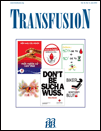
TRANSFUSION
Scope & Guideline
Pioneering Insights into Blood Management Strategies
Introduction
Aims and Scopes
- Clinical Transfusion Practices:
Explores optimal transfusion practices, guidelines, and protocols for various patient populations, including pediatric, obstetric, and trauma patients. - Blood Safety and Pathogen Reduction:
Investigates methods and technologies to ensure the safety of blood products, focusing on pathogen inactivation, screening, and the prevention of transfusion-transmitted infections. - Immunohematology and Alloimmunization:
Examines the immunological aspects of transfusion, including alloimmunization rates, antibody detection, and the management of patients with complex immunological needs. - Innovative Blood Donation Strategies:
Studies recruitment and retention methods for blood donors, including the impact of social media, community engagement, and educational interventions. - Transfusion-Related Adverse Reactions:
Analyzes the incidence, risk factors, and management of adverse reactions associated with blood transfusions, contributing to improved patient safety. - Emerging Technologies in Blood Banking:
Focuses on the application of new technologies, such as automation, artificial intelligence, and genomic sequencing in blood banking and transfusion practices. - Quality Improvement in Transfusion Services:
Addresses methodologies for enhancing the efficiency, safety, and quality of transfusion services through process evaluation and improvement strategies.
Trending and Emerging
- COVID-19 Related Research:
Research exploring the implications of COVID-19 on blood donation, transfusion practices, and convalescent plasma therapy has surged, reflecting the pandemic's impact on health systems. - Personalized Medicine in Transfusion:
An increasing trend towards personalized transfusion practices, including the use of genetic screening and tailored transfusion strategies based on patient-specific factors. - Diversity and Inclusion in Blood Donation:
Growing attention to the recruitment of diverse donor populations and addressing barriers faced by underrepresented groups in blood donation. - Technological Innovations:
A rise in studies focusing on the application of automation, artificial intelligence, and advanced data analytics in blood banking and transfusion processes. - Patient Blood Management (PBM) Strategies:
Emerging discussions around PBM practices that prioritize minimizing transfusions and optimizing patient outcomes through evidence-based approaches. - Mental Health and Donor Experience:
Increasing recognition of the psychological aspects of blood donation, with research aimed at improving donor experience and addressing donor-related anxiety.
Declining or Waning
- Traditional Alloimmunization Studies:
Research focused on classic alloimmunization mechanisms seems to be waning, as newer studies incorporate broader immunological perspectives and advanced genomic techniques. - General Blood Donation Trends:
General studies examining blood donation rates without specific interventions or demographic focus are less common, replaced by more targeted research on underrepresented donor populations. - Standardized Risk Assessment Protocols:
The emphasis on uniform risk assessment protocols for blood donors has diminished, with a shift towards individualized and nuanced approaches to donor eligibility. - Historical Perspectives on Transfusion Medicine:
Less emphasis is being placed on historical analyses of transfusion practices, as the field increasingly focuses on contemporary challenges and innovations.
Similar Journals

Journal of Blood Medicine
Empowering Research: Your Gateway to Innovations in HematologyThe Journal of Blood Medicine, published by DOVE MEDICAL PRESS LTD, stands as a vital resource in the field of hematology, focusing on the latest research developments and clinical advancements in blood medicine. With an impact factor reflective of its growing relevance, this open-access journal has been delivering quality scholarly work since 2010, ensuring that critical research is readily available to the global scientific community. The journal operates under an open-access model, further enhancing its dissemination and accessibility to researchers, professionals, and students alike. In the 2023 rankings, it secured a Q3 category status within hematology and achieved a commendable 76th rank out of 137 in Scopus listings, indicating its commitment to quality and innovation in this specialized area. Located in New Zealand, the journal's diverse topics encompass clinical research, treatment modalities, and emerging therapies, contributing significant insights vital for shaping future advancements in blood medicine.

Journal of Hematology
Bridging Knowledge Gaps in HematologyThe Journal of Hematology, published by ELMER PRESS INC, serves as a pivotal platform for disseminating cutting-edge research in the field of hematology. With an ISSN of 1927-1212 and an E-ISSN of 1927-1220, this journal is committed to advancing scientific knowledge and clinical practice through high-quality peer-reviewed articles encompassing all aspects of blood disorders, from basic science to health policy implications. While the journal currently operates under a traditional access model, it nonetheless prioritizes the rapid publication of significant findings, ensuring that researchers, clinicians, and students have timely access to the latest advancements in hematological research. Positioned to bridge gaps in knowledge and foster collaboration among scholars worldwide, the Journal of Hematology is an essential resource for anyone invested in this vital area of medicine.
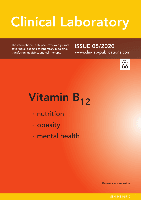
Clinical Laboratory
Fostering Collaboration in Clinical Laboratory PracticesClinical Laboratory is a reputable journal dedicated to the interdisciplinary field of clinical biochemistry, genetics, and molecular biology. Published by CLIN LAB PUBL in Germany, this journal provides a platform for the dissemination of original research, reviews, and key insights into laboratory practices and innovations that play a crucial role in modern medicine and diagnostics. With an ISSN of 1433-6510 and a consistent publication history since its inception in 1964 and converging through 2024, it is indexed within the Scopus database, ranking in the 30th percentile among its peers. Although classified in the third quartile for 2023 in the field, Clinical Laboratory continues to contribute valuable knowledge and fosters collaboration among researchers, professionals, and students. Notably, it does not currently operate as an Open Access journal, which emphasizes its commitment to maintaining high-quality peer-reviewed content accessible through institutional and library subscriptions. For those in the domain, Clinical Laboratory serves as a vital resource for the latest advancements and trends shaping the future of clinical laboratory science.
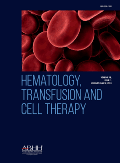
Hematology Transfusion and Cell Therapy
Empowering discoveries in transfusion medicine.Hematology Transfusion and Cell Therapy, published by Elsevier, is a leading Open Access journal dedicated to advancing the fields of hematology, immunology, and transfusion medicine. Since its establishment in 2018, this journal has provided a vital platform for sharing innovative research and clinical advancements in the management of blood disorders and cellular therapies. Based in Brazil, it attracts a global audience, facilitating access to high-quality research that influences clinical practice and policy. With a current impact factor that places it in the Q3 category for both hematology and immunology as of 2023, the journal is recognized for its rigorous peer-review process and commitment to disseminating significant findings. By featuring a diverse range of articles, from original research to reviews, Hematology Transfusion and Cell Therapy aims to foster collaboration and knowledge sharing among researchers, professionals, and students alike, empowering them to tackle emerging challenges in their fields.
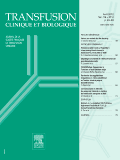
TRANSFUSION CLINIQUE ET BIOLOGIQUE
Elevating clinical practices through rigorous research.TRANSFUSION CLINIQUE ET BIOLOGIQUE, an esteemed journal published by Elsevier France - Éditions Scientifiques Médicales Elsevier, has been a pivotal resource in the fields of transfusion medicine, biochemistry, and hematology since its inception in 1994. With a strong commitment to advancing scientific knowledge, this journal provides a platform for high-quality research and clinical studies aimed at improving patient care and outcomes in transfusion practices. Although categorized in Q3 and Q4 quartiles across multiple categories in Biochemistry and Medicine for 2023, the journal holds significant potential for growth and impact within the scientific community. While it currently does not offer open access options, its indexing in reputable databases ensures visibility and reach among professionals and researchers. As the field evolves, TRANSFUSION CLINIQUE ET BIOLOGIQUE aims to continue fostering innovation and collaboration, making it a valuable tool for anyone involved in medical, biochemical, and hematological research.
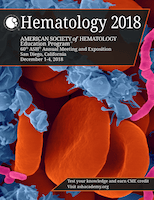
Hematology-American Society of Hematology Education Program
Navigating the Future of Hematology TogetherHematology-American Society of Hematology Education Program is a premier peer-reviewed journal dedicated to advancing the field of hematology through comprehensive educational content. Published by the American Society of Hematology, this journal plays a crucial role in disseminating knowledge to researchers, clinicians, and students in hematology and related disciplines. With an impressive Q1 status in the field, it ranks among the top journals at the forefront of hematological research, as evidenced by its 60th percentile ranking in Scopus' Medicine - Hematology category. Although it does not offer open access, the journal provides invaluable insights and educational resources from leading experts, focusing on the latest advancements, treatment protocols, and evolving understanding of blood disorders. Covering a wide range of topics, from basic research to clinical applications, this journal is essential for anyone seeking to deepen their expertise and stay informed on the latest developments in hematology. For further engagement, readers can access insightful articles published since 2001, ensuring a rich repository of knowledge for ongoing research and clinical excellence.

INTERNATIONAL JOURNAL OF HEMATOLOGY
Pioneering Discoveries in Hematological ScienceThe INTERNATIONAL JOURNAL OF HEMATOLOGY, published by SPRINGER JAPAN KK, serves as a critical platform for advancing research in the field of hematology. With a prestigious history spanning over three decades from 1991 to 2024, this journal is recognized for its impactful contributions, evidenced by its Q2 category ranking in Hematology for 2023, and its notable position at rank #71 out of 137 in the Scopus Medicine Hematology category. Researchers and professionals within the hematology community benefit from the journal's rigorous peer-reviewed articles that cover a wide range of topics, including clinical studies, basic research, and novel therapeutic strategies. Though currently non-open access, it provides essential insights and findings to an audience passionate about the latest advancements in blood disorders and treatments. Situated in Japan, the journal not only showcases high-quality research but also fosters a global exchange of knowledge in hematology, making it a significant resource for scholars, practitioners, and students alike.
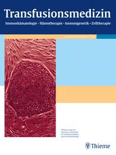
Transfusionsmedizin
Exploring the forefront of transfusion therapy advancements.Transfusionsmedizin is a premier journal dedicated to the field of transfusion medicine, published by the renowned GEORG THIEME VERLAG KG. With an ISSN of 2191-8805 and an E-ISSN of 2191-8813, this journal serves as a vital platform for disseminating cutting-edge research and clinical advancements in blood transfusion practices. Although it operates under a subscription model, the journal is committed to high-quality peer-reviewed content that addresses contemporary challenges and innovations in transfusion therapy. By fostering dialogue among researchers, clinicians, and students, Transfusionsmedizin aims to advance patient care and enhance the safety and efficacy of transfusion practices globally. Its contributions are essential for professionals engaged in transfusion science, hematology, and related medical fields, solidifying its reputation as a critical resource for staying abreast of the latest developments in transfusion research.
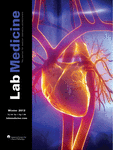
AMERICAN JOURNAL OF CLINICAL PATHOLOGY
Empowering Research in Pathology and MedicineThe American Journal of Clinical Pathology, published by Oxford University Press Inc, stands as a vital resource in the fields of pathology and clinical medicine. With a rich history dating back to 1945 and an impressive impact factor reflected in its Q1 ranking in Pathology and Forensic Medicine, this journal serves as a cornerstone for researchers and professionals seeking to advance their knowledge and practice. Covering a breadth of topics within the discipline, it is recognized in 2023 as ranked #24 out of 208 in its category, highlighting its esteemed reputation within the scientific community. Although the journal does not currently offer open access, its rigorous peer-reviewed articles and cutting-edge research make it an essential addition to any academic or clinical library. The ISSN for print version is 0002-9173, with an E-ISSN of 1943-7722 available for digital access. Researchers, students, and practitioners alike will benefit from its comprehensive scope and commitment to disseminating high-quality scientific inquiry.
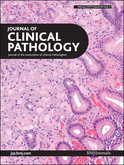
JOURNAL OF CLINICAL PATHOLOGY
Advancing the Future of Clinical InsightsJOURNAL OF CLINICAL PATHOLOGY, published by BMJ PUBLISHING GROUP, stands at the forefront of advancements in the field of clinical pathology, offering a platform for groundbreaking research and insights from 1948 to the present. With an impressive impact factor and categorized as Q1 in both Medicine (miscellaneous) and Pathology and Forensic Medicine for 2023, the journal holds a distinguished position in the academic community, ranking 22nd out of 208 journals in its category on Scopus and representing the 89th percentile. While the journal does not currently offer open access, it remains a vital resource for researchers, healthcare professionals, and students seeking to stay current with innovative methodologies, clinical techniques, and diagnostic advancements. Located in London, United Kingdom, the journal aims to bridge the gap between laboratory findings and clinical practice, emphasizing the importance of evidence-based pathology in improving patient care and treatment outcomes. Engage with the JOURNAL OF CLINICAL PATHOLOGY to enhance your understanding and contribute to the evolving landscape of clinical pathology research.